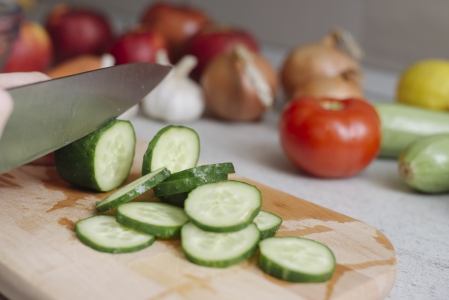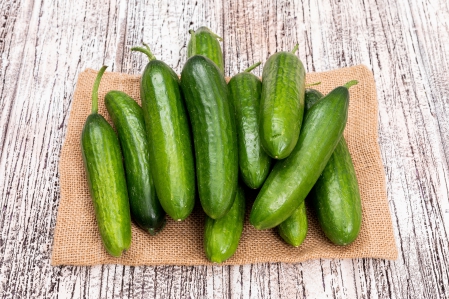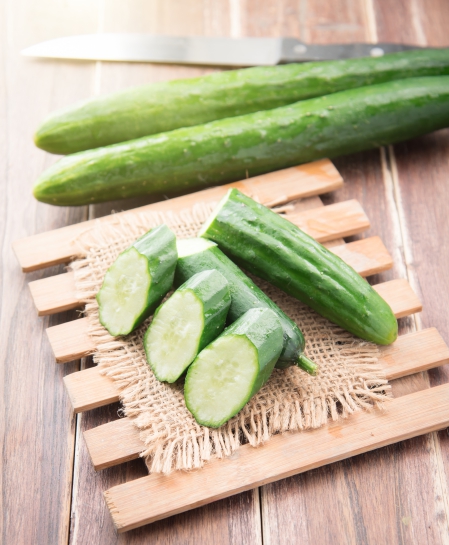Cucumber is an important fibre rich food stuff that is widely used in preparing especially salads and sandwiches. It is very beneficial particularly for those individuals who suffer from cardiovascular diseases, diabetes and obesity as it does not contain any cholesterol or fat and provides very less calorie. It also helps to prevent constipation and promotes gut health. On the other hand, some individual experiences gastrointestinal distress after consuming cucumber due to the presence of a bitter substance within it. This bitter substance is called cucurbitacin. It has seen that increase in bitterness of the cucumber increases digestive discomfort, which is known as burp. It is better to consume burpless cucumber as it may not develop any digestive disorders. Burpless cucumbers are generally sweet and crisp (when it is fresh) and have fewer seeds and thinner skin. It is free from cucurbitacin and hence related with decreasing the susceptibility of burping.
What makes a cucumber burpless?
- Cucumber belongs to curcubit family and it has seen that cucumber often possesses bitterness due to the presence of cucurbitacin within it
- Cucumber may contain low or high cucurbitacin and its concentration is entirely depending upon the stress level endured by the plant during its growing phase
- It has seen that alteration in moisture content of soil or alteration in temperature is responsible for respective plant stress. Increase stress level is associated with increasing the bitterness
- Cucurbitacin is found in concentrated form in the stem end of cucumber. Cutting of the stem end (about one inch) and peeling the skin before consumption would eliminate most of the bitter parts of cucumber and consumption of such cucumber does not cause any digestive irritability (burp)
- Recently various agricultural technologies are implemented for cultivating burpless cucumber plant that produces burpless cucumber directly (which has no cucurbitacin)

Nutritional profile
- It is rich in moisture. It has seen that it contains about 95%of water
- It contains very less amount of carbohydrates especially complex carbohydrate hence it is considered as a low glycemic food
- It contains significant amount of dietary fibre
- It does not contain any proteins
- It is completely free from fats and cholesterol
- It is rich in several micronutrients such as sodium, potassium, calcium, phosphorus, manganese and magnesium
- It also contains too some extent of Vitamin A, vitamin K, Vitamin C, biotin, niacin, riboflavin, thiamin and panthatenic acid
- It also contains several phytonutrients known as lignans which act as an effective antioxidant
Health benefits
Role on promoting gastrointestinal health
- Fibre content of cucumber is the main substance responsible for promoting gastrointestinal health. It has seen that ingested fibre generally passes through intestine in undigested form which is responsible for increasing the mass of the stool. It also helps in water retention that makes the stool soft. These two features are responsible for easy defecation and hence help to prevent constipation
- Consumption of cucumber is beneficial to promote especially colonic health as its fibre contents help in improving peristalsis that leads to improve bowel movement and prevents the prevalence of colon cancer, colonic pouch formation and irritable bowel syndrome
- Cucumber also plays significant role in promoting digestion

Role on promoting cardiac health
- Cucumber has cardio protective effects hence its consumption is beneficial for preventing the risk of developing cardiovascular diseases
- Fibre content of cucumber is considered as the principal factor that protects the heart from damages. As it helps to increase HDL concentration and decreases LDL level in body, which helps to prevent atherosclerosis
- Consumption of cucumber is also related with decreasing blood pressure. Potassium, fibre and magnesium contents of cucumber mainly show the hypotensive effects
Role on preventing diabetes
- Cucumber contains significant amount of fibre, which helps to reduce blood sugar level
- It helps to inhibit glucose uptake from gastrointestinal epithelial cell that leads to decrease post prandial peak
- Cucumber contains very few amounts of carbohydrates hence it is safe to be consumed by diabetic patients as it does not increase glycemic load. This feature is considered as one of the most important features for reducing blood sugar level

Role on skin
- Cucumber contains a compound called silica, which is associated with developing connective tissue
- Silica helps to make the skin healthy and helps to brighten
- It is beneficial to consume cucumber as it helps to prevent various skin disorders
Role on preventing menstrual problems
- Consumption of cucumber is beneficial for preventing menstrual pain, cramp and symptoms of premenstrual syndromes
- Vitamin K of cucumber is responsible for stimulating hormone secretion and hormonal functions that are accountable for proper running of menstrual cycle and prevents its complication
Role on weight management
- Consumption of cucumber is very beneficial especially for obese individual as it helps in reducing body weight
- As we know that cucumber provides very low calorie as it does not contain any fat and contains very less amount of carbohydrates hence its consumption is beneficial for inhibiting weight gaining. It also provides a feeling of stomach fullness without providing too much calorie
- Consumption of cucumber is related with preventing appetite leads to reduced food intake that also helps in weight reduction
- Fibre content of cucumber helps to decrease LDL concentration that leads to inhibit fat accumulation within body hence prevents obesity
- It has seen that consumption of cucumber is related with increasing the catabolic rate of the body, that helps in increasing energy expenditure and leads to weight reduction

Role on hydration
- Cucumber is called a perishable food that means it is rich in moisture content
- Consumption of cucumber helps to hydrate the body due to its high-water content and hence helps to improve the overall health status
Role on bones
- Vitamin K content of cucumber is responsible for enhancing bone mineral density that helps to increase bone mass and reduces the risk of bone fractures
- It has seen that Vitamin K helps in calcium utilization and helps to maintain calcium balance within body which is closely related with bone metabolism
Traditional usage
Cucumber has been used traditionally for various purposes which include –
- To cure sprue and its consequences, raw or ripen cucumber has been used for centuries
- It has been widely used to inhibit dysentery
- The seeds of cucumber have been used as taeniacide
- Cucumber has been used for treating various skin disorders such as sores, rashes, wounds, blemishes. It has also used for moisturizing, whitening and softening the skin
- Extract of cucumber plant leaves has been significantly used for treating dyspepsia
Risk factor
Excessive consumption of cucumber is not good for health. It may develop various deadly complications. As mentioned above cucumber contains cucurbitacin, which is responsible for burping. Whereas, it has seen that curcubitacin in excessive amount is very much toxic and it may develop swelling of various organs such as kidney, liver, pancreas, gall bladder and if it is not treated in early stage then it would cause multi organ dysfunction, which is very fatal.


Source:
Agatemor, U.M.M., Nwodo, O.F.C. and Anosike, C.A., 2018. Phytochemical and proximate composition of cucumber (Cucumis sativus) fruit from Nsukka, Nigeria. African Journal of Biotechnology, 17(38), pp.1215-1219.
Heflebower, R. and Drost, D., 2020. Cucumber in the Garden.
Murad, H. and Nyc, M.A., 2016. Evaluating the potential benefits of cucumbers for improved health and skin care. Journal of Aging Research & Clinical Practice, 5(3), pp.139-141.
Niyi, O.H., Jonathan, A.A. and Ibukun, A.O., 2019. Comparative Assessment of the proximate, mineral composition and mineral safety index of peel, pulp and seeds of Cucumber (Cucumis sativus). Open Journal of Applied Sciences, 9(09), p.691.
Pertami, S., Rahayu, D. and Budiono, B., 2017. Effect of cucumber (Cucumis sativus) juice on lowering blood pressure in elderly. Public Health of Indonesia, 3(1), pp.30-36.
Reddy, P.P., 2016. Cucumber. In Sustainable Crop Protection under Protected Cultivation (pp. 297-311). Springer, Singapore.
Tateno, C.R., 2017. Cucumber core remover. U.S. Patent Application 14/756,149.
Weng, Y., 2016. The cucumber genome. In Genetics and Genomics of Cucurbitaceae (pp. 183-197). Springer, Cham.



